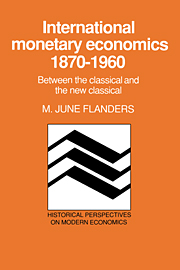12 - The late classicals
Published online by Cambridge University Press: 12 October 2009
Summary
We turn to an examination of the “Taussig school”. Ohlin dubbed them the “Harvard school”; I prefer the label late classical. The books in question span (in terms of publication dates) the 1920s and most of the 1930s. I include here the following works by Taussig and his famous students: Williams (1920), Viner (1924) and (1937), Taussig (1927), and White (1933). Viner (1937) pursues a controversy with Angell, who had criticized the earlier book. I have also included Angell (1926), who would surely have objected strenuously. In terms of what he was aiming at, Bresciani-Turroni (1932) should perhaps have been included here, but I have concentrated on the people around Taussig. (Incidentally, a casual survey indicates that most of the important native-born American economists in the field of international economics until the post-World War II period were direct “descendants” of Taussig, since Kindleberger was Angell's student, and Bloomfield Viner's.)
All of these are basically classical in their approach, as distinct from neoclassical. I have labeled them “late classical”, though perhaps “banking-system classical” would be appropriate. Unlike Hume, Mill, and Ricardo, they deal very explicitly with systems characterized by a modern banking system with the important characteristic of fractional-reserve banking.
- Type
- Chapter
- Information
- International Monetary Economics, 1870–1960Between the Classical and the New Classical, pp. 223 - 244Publisher: Cambridge University PressPrint publication year: 1990



